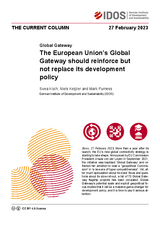Global Gateway
The European Union’s Global Gateway should reinforce but not replace its development policy
Koch, Svea / Niels Keijzer / Mark FurnessThe Current Column (2023)
Bonn: German Institute of Development and Sustainability (IDOS), The Current Column of 28 February 2023
Bonn, 28 February 2023. More than a year after its launch, the EU’s new global connectivity strategy is starting to take shape. Announced by EU Commission President Ursula von der Leyen in September 2021, the initiative was baptised ‘Global Gateway’ and reflected her ambition to lead a “geopolitical Commission” in “a new era of hyper-competitiveness”. Yet, after much speculation about its exact focus and questions about its slow roll-out, a list of 70 Global Gateway flagship projects has been circulated. Global Gateway’s potential scale and explicit geopolitical focus implies that it will be a massive game-changer for development policy, and it is time to pay it serious attention.
The EU intends to make Global Gateway “a trusted brand around the world”, thereby overcoming a perceived lack of visibility and recognition of its contributions to global development compared to those provided by other partners, in particular China’s Belt and Road initiative. Global Gateway promises large-scale infrastructure investments in five sectors: digital, climate and energy, transport, health, and education and research.
The Commission’s Directorate-General (DG) for International Partnerships, which has succeeded the former DG for development cooperation, has a key role in implementing Global Gateway. The initiative aims to finance EUR 300 billion in global infrastructure investment by 2027, for which it will draw on the EU’s development aid budget. Thus far, however, there has been more focus on its geopolitical ambitions than on its implications for existing development objectives and initiatives.
Risky business for the EU’s development policy?
Several critical points remain unaddressed. The first is the potential reputational risk of falling short on big promises. The EU will only achieve its EUR 300 billion target if Global Gateway attracts enough private investment. So far, the EU does not have a convincing track record in leveraging private capital for investments outside Europe, and the extent to which member states will support Global Gateway with public funds is unclear. Private sector engagement with the initiative is also uncertain and will depend on risk-reward calculations that may be difficult to reconcile with established development cooperation principles.
A second critical point is raised by the ‘old wine in new bottles’ argument that critics highlight by pointing out that many Global Gateway flagship projects were already under design or even being implemented. This critique is valid to an extent, even though it is much more important to focus on Global Gateway’s next phase. The upcoming review of the EU budget later this year may free up additional resources for new projects. The ‘new wine’ must not simply replace existing cooperation programmes with investments, both in terms of where attention is dedicated and also in terms of aid allocations.
Global Gateway’s visibility campaign poses a third risk. By making investments in Global Gateway the European ‘brand’ for development, other investments that are not infrastructure related but support the SDGs more broadly will inevitably become less visible. Examples include the EU’s engagement with conflict-affected states, social protection and human development, efforts to address inequality, and support for governance and civil society. These areas of focus represent the ‘human face’ of the EU’s development policy and are its biggest strengths. A fourth and closely related risk is posed by the potentially conflicting objectives of Global Gateway and development policy goals. There are, for example, obvious incoherencies in supporting authoritarian governments with large infrastructure projects, while at the same time emphasising the value-based nature of the EU’s development policy and its democracy support programmes.
The Global Gateway is a welcome, timely and politically salient initiative. Yet, the EU still needs to clarify its contribution to development policy. Global gaps notwithstanding, EU support for the construction of roads, bridges, harbours, power stations, internet cables and other visible infrastructure will not foster inclusive development on its own. Such investments have to be well-embedded in other forms of cooperation, focusing on inclusive societies, responsive and accountable institutions, and fair policies that support rather than hinder sustainable development. The EU is right to raise its geopolitical ambition and Global Gateway has the potential to make friends and influence people. The EU and its member states have nevertheless committed to supporting the sustainable development trajectories that these infrastructure investments can underpin, and this should remain Europe’s core interest.




